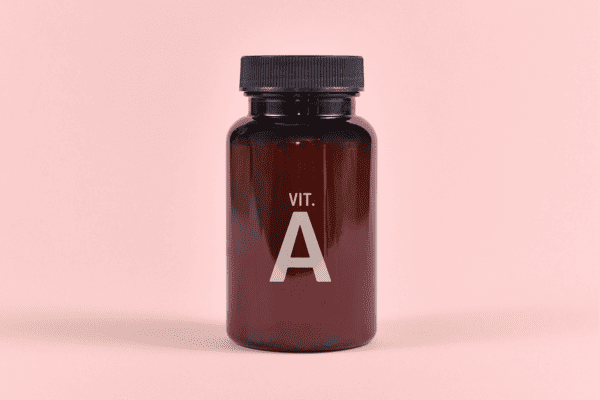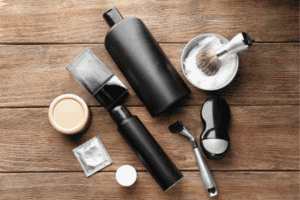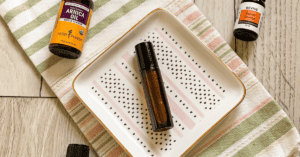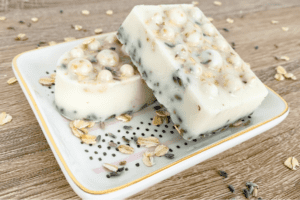5 Best Clean Retinol Products (Does Clean Retinol Exist?)
Find out if clean retinol even exists, and which retinol products are the safest!
Are you looking for clean retinol skincare products? Maybe you’ve been working hard to use only clean and natural beauty products, and it’s time to replace your retinol serum. As in, you just ran out and need to buy more!
Should you buy another retinol product? Or switch to something else entirely? Is retinol even considered clean?
It can be so hard, knowing what to keep and what to replace, when making the switch to clean beauty. And there seems to be so many conflicting opinions!
Pin this image for later!
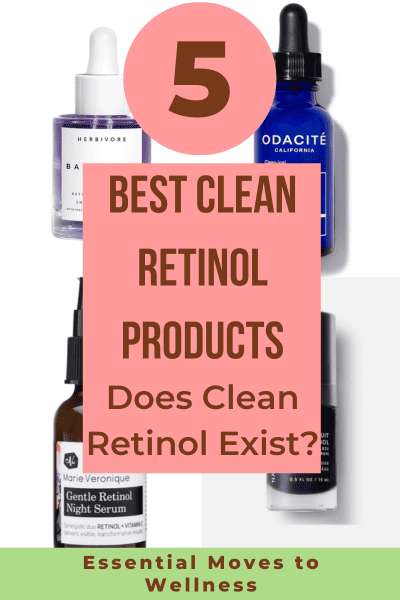
The truth is, some people do use retinol in their clean skincare regimen; and some don’t. And that’s okay!
Because clean beauty is a spectrum, not a hard and fast rule. What works for one person won’t necessarily work for another.
And everyone’s definition of “clean” is different. What matters is that we are all taking steps to live a healthier, cleaner life – together.
So, in this post, we’ll talk about the benefits of retinol, whether it’s even considered clean, and where you can find natural alternatives for it. Plus, I’ll share my top recommendations for clean retinol skincare products.
And if you’re tired of being overwhelmed and confused about clean beauty, grab my new ebook, Essential Moves to Clean Beauty! It’ll help you sort it all out!
Let’s get started.
This post contains affiliate links. You can learn more here.
What is Retinol?
But first, what actually is retinol?
Retinol is a synthetic form of Vitamin A. It is a type of retinoid, which is a group of compounds that are derived from Vitamin A. This means they are similar to Vitamin A – they have the same structure and function the same.
But retinoids are a man-made form of Vitamin A. Retinoids are classified into four generations:
- 1st Generation – Retinol, Retinaldehyde, Tretinoin, Isotretinoin, and Alitretinoin.
- 2nd Generation – Etretinate and Acitretin.
- 3rd Generation – Adapalene and Tazarotene
- 4th Generation – Seletinoid G
And there are many different types of retinoids. Some are gentle enough to be used in over-the-counter products, and some require a prescription.
Some common retinoids you may encounter are:
- Over-the-Counter – Retinyl Esters, Retinol, Retinaldehyde, Retinoic Acid Esters, and Adapalene.
- Prescription Strength – Retinoic Acid, Tretinoin, Isotretinoin, Trifarotene, and Tazarotene.
However, not all retinoids are created equal. Some are stronger than others, and some have more side effects, especially if you have sensitive skin.
What Does Retinol Do for Your Skin?
What doesn’t retinol do for your skin!
In the skincare industry, retinol takes center stage. It’s the superstar ingredient that creates that youthful, healthy glow everyone is after. Retinol:
- Eliminates the signs of aging
- Improves the appearance of fine lines and wrinkles
- Improves skin texture
- Helps even skin tone
- Helps promote skin cell turnover
- Prevents pores from clogging
- Stimulates collagen
- Fades hyperpigmentation
- Lightens dark spots
- Reduces acne scarring
- Improves water skin barrier properties
And it is commonly used to treat acne. It is almost a miracle ingredient. It’s no wonder it stirs up so much controversy!
Is Retinol Considered Clean?
No, technically it is a synthetic retinol, developed in a lab. It does not come from plants or any other natural source. So, it’s not considered “clean”.
But we all have our own definition of “clean”. Some people will use synthetic ingredients in their clean skincare routine, if those ingredients have been proven to be safe. And there are a lot of studies that show retinol is safe.
But there are a few reasons you may want to avoid retinol, as well:
- High doses of Vitamin A are not good if you are pregnant or breastfeeding.
- There is a risk of skin cancer when exposed to the sun.
- It is associated with developmental toxicity and birth defects.
If you have sensitive skin, you may also want to stay clear from retinol. It has a lot of not so pleasant side effects, such as dry, flaky skin, or tight, red skin.
Ultimately, whether retinol is considered clean depends on your definition of clean. If you stick strictly to only products with all natural ingredients, then you’ll want to steer clear of retinol serums.
I used to be this way. If I found out that an ingredient was made in a laboratory, I would steer clear. But this isn’t the best way to go, in my opinion.
As long as an ingredient has undergone heavy testing by unbiased parties, then I don’t have a problem with the ingredient if it’s been proven to be safe. We have technology for safe beauty, so why not use it?!
Is There a Natural Retinol?
If you use only skincare products with natural ingredients in them, then you may be wondering if there is a natural form of retinol.
Sorry, but no. Retinol is strictly man-made, and is not found naturally in nature. So using it is ultimately up you to and how you feel about that.
There are, however, natural alternatives, that we’ll get into in just a bit. And there are some clean brands that formulate retinols with better supporting inactive ingredients. If you choose to use a product with retinol, you may want to consider one of those brands.
What is the Purest Form of Retinol?
Your skin has to convert retinoid into retinoic acid (Tretinoin) before the retinol can regenerate skin cells and stimulate collagen production. So, most retinoids do need to be converted.
Except retinoic acid. It doesn’t need to be converted because it’s already in its purest form.
This means it can get to work right away on your skin. But it is also only found in prescription drugs, and can cause side effects, because it is a harsher on your skin. It’s not something I recommend playing around with unless you talk to a doctor first.
Anything in non-prescription products will be gentler but must be converted several times before benefiting your skin.
That is why it may take longer for noticeable results. You need to be consistent and patient, when you apply retinol.
What is the Best Form of Retinol?
If you want to know what the best form of retinol is, the answer will depend on what you consider to be “best”.
The strongest topical retinoid is Tazarotene, which is also known as Tazorac. It is used to treat acne, psoriasis, and sun-damaged skin. But it can be especially drying, even more so than Tretinoin.
The purest form, of course, is Tretinoin. And if you are looking for a retinol that is gentle on the skin, then retinyl palmitate might be best.
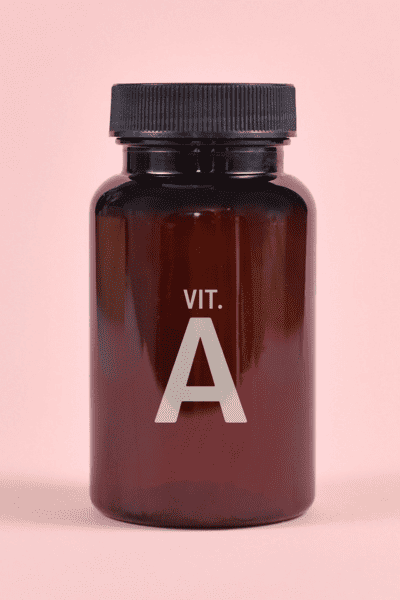
Natural Alternatives to Retinol Serums
There are some natural alternatives to retinol, if you do not want to use a synthetic ingredient in your skin care routine.
These ingredients do produce similar results to retinol, but they do not produce the exact same results. Nothing can, which is why so many organic and clean beauty products still include retinol.
But these plant-based alternatives have little to no side effects!
Bakuchiol
Bakuchiol is the closest to producing the same results as retinol. It is derived from the seed of the Babchi plant, which is native to India and Sri Lanka. The Babchi is often used in traditional Chinese and Indian medicine.
It can:
- Improve skin texture
- Increase collagen production
- Increase firmness and elasticity
- Reduce the appearance of wrinkles
- Reduce hyperpigmentation
- Treat acne and prevent breakouts
In fact, a 2018 randomized, double-blinded trial comparing retinol and bakuchiol found the two had very similar effects. Except the patients who received retinol also had side effects.
It is the closest plant based alternative to retinol. And there’s a fantastic product option for this ingredient!
Cockspur
Cockspur is a potential plant-based retinol alternative. I say potential because there is very little research on it.
However, it is naturally rich in isoflavones and bioflavonoids, and it’s supposed to offer comparable anti-aging results.
Moth Bean
Moth bean is derived from an Asian legume. It’s been shown to increase cell turnover and reduce the appearance of fine lines. It also has antioxidant properties that helps repair damaged skin and sunspots.
Rambutan
Rambutan is another popular alternative to retinol, next to bakuchiol.
This fruit plant, native to Southeast Asia, doesn’t fight acne, like retinol does. But it does help with skin elasticity, rejuvenation, and age spots. It also minimizes visible signs of fine lines and boosts hydration. So, if you have sensitive or dry skin, it might be a great retinol alternative.
Rosehip oil, squalane oil, carrot oil, cacay oil, resveratrol, and astaxanthain have all also been used as natural alternatives to retinol serums.
The Best Clean Retinol Products
And now the moment you’ve been waiting for! My recommendations of the best clean retinol skincare products.
Some of these products have retinol in them, and some do not. So, I’ll be sure to point out the ingredients as we go through them. That way you can choose one, based on your own preferences.
The Best Clean Retinol Serum: Odacite Retinol + Hyaluronic Acid Renewing Serum
Odacite Retinol + Hyaluronic Acid Renewing Serum packs a powerful punch! With retinol, hydrating hyaluronic acid, and nourishing vitamins, this formula helps stimulate cell turnover and targets fine lines, wrinkles, and blemishes.
It has a soft, gel-like texture, and is great for anyone with sensitive skin. Plus, the price isn’t too bad for an intense retinol serum. I usually buy it for myself on special occasions!
Ingredients
This renewing serum is made from: rose water, squalene, glycerin, bakuchiol, lonicera caprifolium flower extract, sodium hyaluronate, retinol, lonicera japonica flower extract, lauryl glucoside, polyglyceryl-2 dipolyhydroxystearate, amorphophallus knonjac, cellulose acetate butyrate, triacaprylin, pentaertythrityl tetra-di-tbutyl hydroxyhydrocinnamate, pelargonium roseaum leaf oil, aloe leaf extract, phospholipids, Vitamin E, Vitamin C, Vitamin D3, neem leaf extract, seaweed extract, turmeric root extract, basil leaf extract, ocimum sanctum leaf extract, and sodium benzoate.
Cost: $78 for 1 ounce
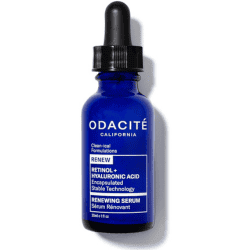
The Best Clean Retinol Cream: Indie Lee Retinol Alternative Cream
Indie Lee uses only natural alternatives to retinol. And while this cream may be an alternative, retinol creams don’t really exist. So if you want to get the real deal, retinol will come in a serum.
It doesn’t deliver exactly the same benefits as retinol does, either, but it is pretty close! Indie Lee is formulated to improve the appearance of fine lines and wrinkles, firmness, and elasticity. And it is much gentler on sensitive skin than retinol.
It goes on smooth and leaves skin looking and feeling plumper and healthier. I like that it’s much gentler. So if the idea of retinol freaks you out, this is a great compromise!
Ingredients
Indi Lee Retinol Alternative Cream is made from: water, triglyceride, propanediol, safflower seed oil, cetearyl alcohol, shea butter, alkane, squalane, glycerin, candelilla wax, cetearyl olivate, mango seed butter, cetearyl glucoside, cetyl alcohol, sorbitan olivate, aloe leaf juice powder, paracress flower extract, orange milk tree extract, rambutan leaf extract, jojoba seed oil, hyaluronic acid, xylitylglucoside, anhydroxylitol, tocopherol, xylitol, xanthan gum, maltodextrin, gluconolactone, sodium levulinate, sodium benzoate, potassium sorbate, sodium anisate, and citric acid.
Cost: $72 for 1.5 ounces
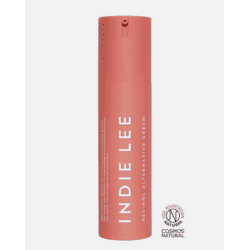
The Best Clean Retinol Eye Cream: Naturopathica Passion Fruit and Retinol Ageless Eye Serum
This retinol eye cream is made with retinol and antioxidant-rich passion fruit. It alleviates puffy, dark circles around the eyes and softens and smooths delicate skin. It’s moisturizing and gentle on sensitive skin, as well.
When I have the budget for this product, it makes my under eye area look like I haven’t missed a day of sleep in my life! It’s really worth the money, in my opinion. But it certainly costs a lot!
Ingredients
Water, glycerin, triglyceride, sodium acrylates copolymer, oat kernel extract, tetrahexyldecyl ascorbate, soybean oil, propanediol, avocado oil, hydrogenated polyisobutene, caprylyl glycol, lecithin, tocopheryl acetate, phospholipids, polyglyceryl – 10 stearate, sunflower seed oil, retinol, cylindrotheca fusiformis extract, caprylhydroxamic acid, tetrasodium glutamate diacetate, horse chestnut seed extract, sodium hyaluronate crosspolymer, polyglyceryl – 6 ricinoleate, acetyl tetrapeptiede-5, tocopherol, beta-glucan, Passiflora edulis seed oil, coelastrella vacuolate oil, watanabea reniformis oil, sucrose, potassium sorbate, sodium benzoate, 2-hexanediol, sorbic acid, pentylene glycol, sodium glycolate, sodium formate, and chlorphenesin.
Cost: $100 for .5 ounces
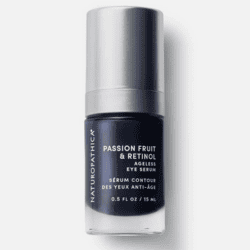
The Best Natural Retinol Night Cream: Marie Veronique Gentle Retinol Night Serum
This night serum combines retinol with Vitamin C and Vitamin E for some serious results. The high-tech formula boosts collagen production, speeds cellular turnover, smooths fine lines and wrinkles, and fights acne. And it’s gentle on the skin!
I do have to say that some people are not a fan of the smell, though! For some, it smells like hot dogs or orange chicken. And for others, it’s no bother at all.
If you’re up for an adventure, you may want to try it, just to see what it smells like! To me, it’s not my favorite smell, but I wouldn’t go as far as saying it smells like random food.
Ingredients
This night serum is made from: green tea leaf infusion, citrus aurantium hydrosol, Vitamin C, glycerin, argan kernel oil, retinol, radish root, jojoba seed oil, Vitamin E, rosehip seed oil, blackberry seed oil, aspen bark extract, xanthan gum, black tea, beta-glucan, sodium hyaluronate, saccharide isomerate, ceramide np, sodium salicylate, glucosamine, sodium pca, algae extract, hops extract, rosemary oleoresin, ubiquinone, Kakadu plum fruit extract, superoxide dismutase, resveratrol, soy lecithin, neroli oil, cistus oil, frankincense oil, turmeric root extract, green myrtle oil, helichrysum flower oil, and carrot seed extract.
Cost: $115 for 1 ounce
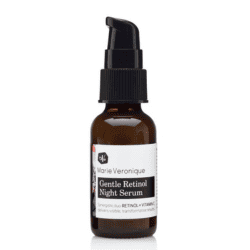
The Best Clean Retinol Alternative: Herbivore Bakuchiol Retinol Alternative Serum
This fun retinol alternative smooths and reduces the appearance of fine lines and wrinkles, while hydrating and plumping your skin. The end result is truly radiant, youthful skin!
Plus, the gel-like serum is purple! With no artificial dyes, of course. I’ve always admired Herbivore’s simple aesthetic.
Ingredients
This bakuchiol serum is made from: water, aloe leaf water, glycerin, psoralea corylifolia seed extract, amethyst extract, radish rood, vaccinium myrtillus fruit extract, blueberry fruit extract, populus tremuloides bark extract, gluconolactone, sodium phytate, tremella fuciformis sporocarp extract, melia azadirachta leaf extract, melia azadirachta flower extract, amino esters-1, coccinia indica fruit extract, eggplant fruit extract, aloe flower extract, ocimum sanctum leaf extract, turmeric root extract, and corallina officinalis extract.
Cost: $56 for 1 ounce
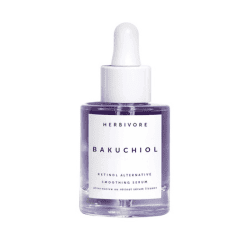
Final Thoughts on Clean Retinol
And there you have it! The low-down on clean retinol.
Just remember that retinol is a synthesized ingredient, and there really is no natural form of retinol. It has amazing skincare benefits, though, and has been deemed virtually safe. That is why many clean beauty brands – and enthusiasts – will still use retinol.
But there are reasons you may want to avoid retinol, especially if you are pregnant or have sensitive skin.
And although there isn’t a natural retinol, there are plant-based alternatives, if you’d like to eliminate retinol from your skincare routine. They can’t give you the exact same results, but they are darn close!
Honestly, if you are ready to purchase a serum, you will do well with any of these on this list. They all will give you youthful, radiant skin!
You can’t go wrong with that! Drop a comment below and let me know your thoughts on retinol. Do you use it? Why or why not?
Related to Clean Retinol
How to Start Your Clean Beauty Transition Without Losing Your Mind
A Quick Guide to Starting a Natural Skin Care Routine for Beginners
Is Silicone Bad for Skin? 10 Reasons to Avoid It
Vitamin C Serum Side Effects and Benefits (Read Before You Buy!)
Using Essential Oils Safely | Here’s Everything You Need to Know

